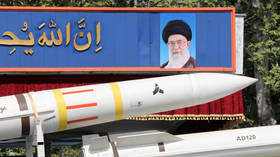US unilateralism may be pushing Japan and South Korea into the open arms of China
Recent developments indicate that Donald Trump’s unilateralist and protectionist “America First” doctrine is pushing a trilateral nexus of China, South Korea and Japan to begin working closely together.
When it comes to eroding the United States’ influence on the global stage, China is making leaps and bounds toward this end.
Not only is China heavily investing in parts of Africa, the Middle East and the Indo-Pacific region with a view of establishing its Silk Road Project, but there are indications that China is making progress converting some key US allies in the Asian continent into some genuine economic allies of Beijing.
China and Japan are the world’s second and third largest economies in the world. South Korea trails a bit further behind at number 12, but in the grand scheme of things, the Southeast Asian nation is still a major economic piece of the Asian economy. Together, the three nations account for over 20 percent of the global economy – no small feat.
Also on rt.com US tech companies to lose $40 billion as China’s Huawei takes its business to EuropeTo date, the US has sat and watched as a successful divide and conquer strategy has essentially curtailed any meaningful development between the three countries, who are always finding ways to be at odds with each other. Even Japan and South Korea, who in recent history’s totality have shared a strong alliance with the United States, a strong disdain for the ‘threat’ that North Korea poses, as well as a deep need to push back against China, seem to struggle to find common ground in various ways.
According to a fairly recent poll, nearly half of South Korea’s population would back the North in a war with Japan, while forty percent responded in the survey that they “have no idea.” Only 15.1 percent of South Korea thinks backing Japan against North Korea is an idea worth implementing. 61 percent of those surveyed believed that Japan is a current military threat to South Korea.
There are some indications that this could slowly change over time. But not by the graceful intervention by the US; in fact, quite the opposite.
According to reports, China is planning a trilateral summit in the southern city of Chengdu next month between Beijing, Seoul and Tokyo. While this is supposed to be an annual occurrence anyway, the fact is that the progress of these summits has been hampered by historical and territorial disputes, often involving Japan.
Just recently, Chinese Premier Li Keqiang told Japan’s Shinzo Abe that trilateral cooperation “would contribute to the world.” With over one fifth of the world’s economy working together, Keqiang’s statement is barely scratching the surface.
Most importantly, China, South Korea, Japan and a number of other key global contenders, including India, Australia and New Zealand, have agreed to sign a regional free-trade agreement known as the Regional Comprehensive Economic Partnership (RCEP) with 10 ASEAN member states. The RCEP is largely viewed as China’s response to the US-led TPP, a monumental agreement involving most of the global economy while specifically excluding China. While I had been skeptical of the TPP and the potential it had to enable large corporations to sue and influence the policies of smaller governments, it blows my mind that Donald Trump pulled the US out of an agreement which was essentially designed to curb China’s influence.
Also on rt.com China – not Iran – is the real reason US troops will never leave IraqTogether, the countries involved in the RCEP represent about one-third of global GDP and close to half the world’s population. Forecasts from the Asian Development Bank estimate the RCEP would contribute about $260 billion to global income benefits.
Just this month, the members of this framework expressed their shared understanding that the agreement reached “will significantly contribute to an open, inclusive and rules-based international trading system and expansion of value chains.” I don’t know if it’s just me, but this statement appears to be a clear jibe at the United States, who is currently hindering global trade on multiple fronts. It isn’t in the least bit surprising that the world might be growing tired and weary of dealing with the US, especially under its current presidency.
Dialogue seems to me to be the key in breaking down years’ long barriers to peaceful development, and dialogue seems to be happening a lot more in this part of the world than the US would probably like to see. Firstly, it is worth mentioning that the aforementioned survey also found that 83.4 percent of South Koreans said a summit between Japan’s and South Korea’s leadership is necessary. Abe even has been expressing his willingness to meet North Korean leader Kim Jong Un “without conditions”, in what would be a breakthrough in the relations between the two nations.
Next spring, Chinese president Xi Jinping is anticipating a state visit to Japan as well.
The development in ties between China, Japan and South Korea has been welcomed with open arms by the editorial team at the South China Morning Post (SCMP), a Hong Kong based newspaper which is by no means pro-Chinese (it was once owned by Rupert Murdoch).
Furthermore, in June this year, 100 academics, diplomats, businesspeople and military experts wrote an open letter to Donald Trump entitled “China is not an Enemy”, calling on the president to review his trade practices with China.
Also on rt.com Anyone here? Trump snubs ASEAN-US summit, 7 out of 10 leaders skip it in protestDon’t get me wrong. China, South Korea and Japan are not going to take over the world’s economy and displace the US from its economic throne overnight. Whether or not it’s the issue of North Korea, territorial disputes, Supreme Court rulings which order Japan to pay compensation, or even just outdated disagreements over never-ending historical conflicts, the three nations will always run into problems which will hinder the extent to which their relations will flourish. To expect otherwise would be somewhat delusional.
But when you sit and analyze China’s progress in this respect, it becomes quite clear that US power and influence is slowly but surely eroding, and the formation of unexpected alliances are starting to quietly emerge in the background. Perhaps nothing major will take place over the next year or so, but if chipping away at American economic hegemony continues over the next few decades, how will the global economy look in 50 years from now (if there is even such a thing in 50 years)?
It would pay to take note of these piecemeal developments now, so that we aren’t totally surprised when Washington decides it needs to take drastic action to “protect” its “interests” and counter and contain China’s rapidly accelerating rise to power.
Like this story? Share it with a friend!
The statements, views and opinions expressed in this column are solely those of the author and do not necessarily represent those of RT.













